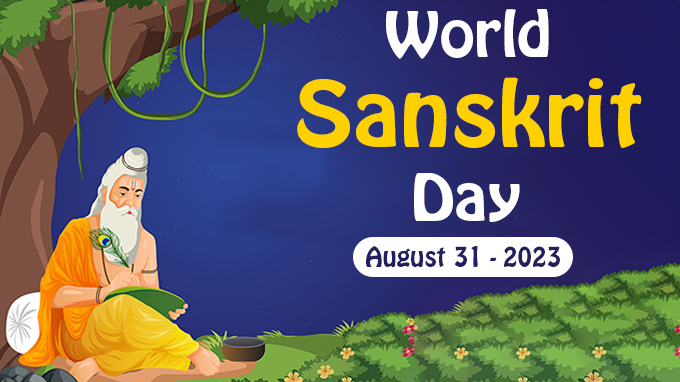
World Sanskrit Day 2023 was celebrated on 31st August 2023.
- World Sanskrit Day 2022 was observed on 12th August 2022.
Significance of Sanskrit Day :
i.The day also aims to raise awareness about the Sanskrit language used by scholars and saints in ancient India to pen several revered books, especially about religious teachings and philosophy.
ii.World Sanskrit Day serves as a tribute to the birth anniversary of Panini, a distinguished Sanskrit scholar and grammarian, who is considered the founder of the language and literature.
Background:
i.In 1969, the Ministry of Education, Government of India (GoI) announced that Sanskrit Day would be celebrated every year at the Central and state levels all over India.
ii.The first World Sanskrit Day was celebrated in 1969.
About Sanskrit:
i.Sanskrit is an ancient and classical language of India in which ever first book of the world Rigveda was compiled. Sanskrit was the classical literary language of the Indian Hindus.
ii.Sanskrit language is divided into 2 parts which are Vedic and Classical.
- Vedic Sanskrit is a part of the Rig Veda, the Upanishads, and the Puranas. The Vedas were composed from 1000 to 500 BCE.
- Classical Sanskrit has its origin at the end of the Vedic period and represents a development of one or more such early Old Indo-Aryan dialects.
iii.Panini, Kalidasa, Patanjali, and Ved Vyas are the prominent personalities who wrote classics in the Sanskrit language.
iv.Sir William Jones, an English scholar, came to India in 1783 and served as the judge of the British Supreme Court in Calcutta (now Kolkata, West Bengal) had a passion for Indic languages and started researching, reading, and understanding the intricacies of Sanskrit.
- He founded the Asian Society in 1784 and translated Manusmriti, Kalidasa’s Abhijnana Shakuntala, Ritu Samhara, and Jayadeva’s Gita Govinda into English.
Points to note:
i.The Sanskrit language is known as the ‘Language of God’.
ii.In 2005, right after Tamil, the GoI declared Sanskrit as a Classical Language of India.
- 6 languages in India namely Tamil (2004), Sanskrit (2005), Telugu (2008), Kannada (2008), Malayalam (2013), and Odia (2014) have been given the status of classical languages. All the Classical Languages are listed in the 8th Schedule of the Constitution.
- The Eighth Schedule to the Constitution consists of 22 languages(including Sanskrit).
iii.In 2010, Uttarakhand became the first state in India to list Sanskrit as its second official language after Hindi.
iv.In 2020, the Uttarakhand Government decided to develop ‘Sanskrit Grams’ across the state, to make people communicate using Sanskrit regularly.
v.In a village named Mattur in the Shimoga district of Karnataka, villagers can be seen speaking in the ancient Indian language, Sanskrit.
vi.The city of Mysuru in Karnataka continues to publish ‘Sudharma‘, the only Sanskrit daily newspaper in the world since 1970 (by print), and is now available online as an e-paper.
- Pandit Varadaraja Iyengar was the publisher as well as the Founder Editor, for almost 20 years.